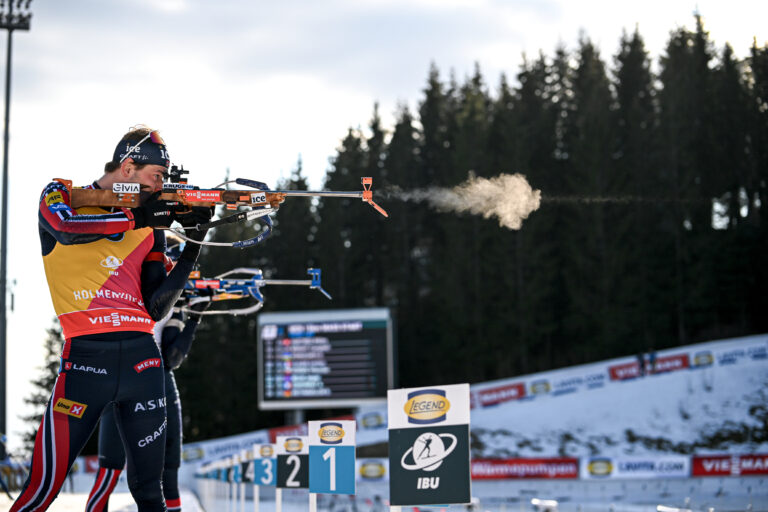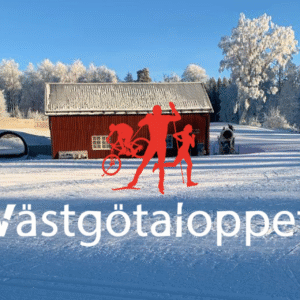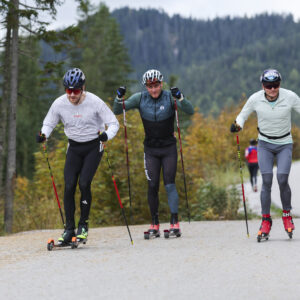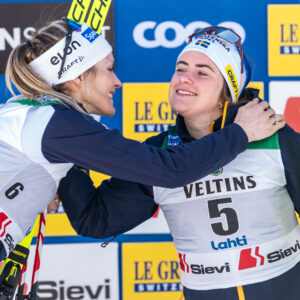Breaking the Silence: Jessie Diggins – Part 2
In this follow-up interview, Jessie Diggins delves deeper into her advocacy, which extends beyond personal experiences as she champions initiatives aimed at promoting mental wellness among athletes.
In our continued conversation with Jessie Diggins, we delve deeper into her advocacy for body positivity and mental health. As an elite athlete who has faced and overcome personal challenges, Jessie shares her evolving mindset regarding food, exercise, and the importance of a supportive environment.
If you missed Part 1, read it here: Breaking the Silence: Jessie Diggins Opens Up
You’ve been very active in promoting body positivity and healthy relationships with food and exercise. How has your mindset shifted over the years as you’ve grown through your own recovery?
J: “In many conversations with people around the world, I’ve realized how common eating disorders and mental health struggles are, and how the love and compassion we can show to others (and ourselves!) makes all the difference. I’ve also realized that, in the society we live in that is filled with diet culture, food fads and advertising, working on a healthy relationship to food and body image will likely be a lifelong journey.”
“I’ve also realized that there is no “perfect recovery” or “recovery timeline”! Everyone recovers on their own timeline and that’s ok if it looks different for you. A relapse doesn’t mean you’re back to square one; it just means you get to re-activate your support team and keep doing the work you need in order to get back to a healthy place.”
Providing a Supportive Environment
What roles do family, and friends play in supporting someone through recovery? How can they best offer meaningful support without causing additional pressure?
J:”The best thing my coaches, family and partner did for me when I told them I was struggling and needed help was saying something like this: “I am so glad you told me, and I want you to know that I love you and care about you as a whole person, not just an athlete. I’m here to talk if you need me, or just watch a movie or go for a walk or drive you to your therapist appointment, and I fully believe in your ability to get to a great place of recovery.””
“They didn’t have to be my therapist, just my cheerleaders and be ready with a hug when I needed it, they were also really compassionate and understanding that recovery is not always a linear process. They knew there would be ups and downs, great days and bad days, and they were patient with me though the tough days, knowing that I was doing my best and still working towards recovery.”
“It’s important that coaches and parents know that while they are a crucial part of the support system for an athlete (adjusting training plans as needed, letting the athlete know they care about their entire well-being and health before race results), they are not responsible for being a therapist. In fact, once the coach or parents connect the athlete to professional therapists trained in eating disorders, they’ve done the most important thing. I think it’s often intimidating for coaches because they feel that they might need to “fix it” for their athletes, but all they need to do is let the athlete know they care and are there for them.”
“As teammates, again they need to know that it’s not their job to be the main support person, just a compassionate and patient friend while their teammate is working towards recovery. Know that your teammate who is struggling likely feels shame and intense guilt and worry, so letting them know that you’re cheering for them in their recovery journey and that it’s ok for them to not be perfect can be a huge help.”
“All that said, eating disorders or any mental health struggle can be hard on the support system, and it’s important for parents, coaches and teammates to have their own person they can talk to if they need to.”
The interview continues below

What steps can we take as a society to create a more supportive and understanding environment for those struggling?
J: “Creating a safe space to talk about mental health is important. We can do this simply by not being judgmental, gossipy, or using language that indicates that anyone struggling with mental health should be ashamed or embarrassed.”
“Another way to be supportive is to invest a little time into education, so that we might be able to recognize signs and symptoms of eating disorders or other mental health. Play around with the NEDA (national eating disorders awareness) website, and even just knowing a few basic facts can help de-stigmatize eating disorders.”
Mental Health and Public Awareness
As the Overall World Cup winner of last season and Olympic champion, how do you balance advocacy for mental health while managing your own well-being, especially in a high-performance environment like competitive sports?
“This is a great question, and an important one! It was intimidating to share my own mental health story while I was going through recovery in real time. While I knew that my story would help so many people know that they’re not alone and that they deserve support, it would be important for me to continue to keep my primary focus on making sure I recovered. Ultimately, I had to remember to keep my health at the top of the to-do list and that it was ok for me to set boundaries on my time and energy in other areas of life so that I could get to a place of recovery. I can only be my best self as a partner, athlete, teammate and advocate if I am in a good place!”
What are some of the most impactful changes or improvements you’ve seen in the way people are talking about eating disorders and mental health since you first shared your story? Particularly referencing your book?
J: “This is perhaps the legacy that I’m most proud to leave behind. Our National Team has come such a long way in terms of mental health support, open conversations and a wellness passport program that looks out for the entire well-being of the athletes. I’ve also had the honour of hearing from so many people about their own journeys to more positive mental health, and just knowing that people feel comfortable talking about it shows that we have made so much progress in de-stigmatizing these topics.”
You can buy Jessie’s book here
The Norwegian Sporting Association recently acquired a 1.4 million USD grant over the next 3 years for support in combating eating disorders within the sport, with advocacy from Theresa Johaug. Looking to the future, what are some goals you have as an ambassador for the Emily Program? Are there any projects or initiatives you are particularly excited about?
J: “This is really awesome news to hear, and I’m glad to see this support being given to athletes! I’m excited to keep working to provide feedback within our own team systems for how we can continue to support those struggling with mental health. I’m also excited by the expansion of the Emily Program to include more treatment centres.”
Read more: Johaug: A cultural change is needed
If you would like more resources or further information, please visit The Emily Program.










